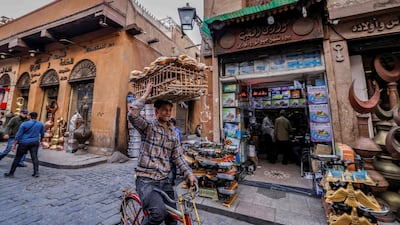The World Bank's board has approved a new Country Partnership Framework for Egypt that provides the country with $7 billion in funds over the 2023 to 2027 fiscal years.
The framework is in line with the Egyptian government's two-pronged 2030 and 2050 development and climate change plans, the Washington-based lender said on Wednesday.
The agreement will be enforced jointly by the World Bank, the International Finance Corporation and the Multilateral Investment Guarantee Agency (Miga), building on the three institutions’ current portfolios and adopting a flexible approach to lending, the World Bank said.
The framework will be supported through $7 billion in lending — with the IBRD extending $1 billion a year for the entire period while about $2 billion will come from the IFC — in addition to guarantees from Miga.
The agreement will be carried out in co-ordination with Egypt's Ministry of International Co-operation, headed by Rania Al-Mashat, who is also the World Bank Group’s governor in the country.
The framework deal “supports Egypt’s efforts to build back better by creating conditions for green, resilient and inclusive development,” said Marina Wes, World Bank country director for Egypt, Yemen and Djibouti.
“It puts the Egyptian people at the centre of its strategy, with a heavy focus on job creation, by improving the business environment and levelling the playing field.”
Egypt's economy has faced immense strain since the Russia-Ukraine war began in February 2022, with the conflict compounding the country's woes.
Over the past year, the Egyptian pound has been devalued three times and lost about 50 per cent of its value against the US dollar, while inflation has soared. The pound is the worst-performing currency globally this year.
Inflation is up about 32 per cent year on year, primarily on soaring food prices, and is forecast to rise more.
"The abundance of inflationary pressures and the desirability of accelerating the pace of disinflation is likely to prompt further monetary tightening by the Central Bank of Egypt, in our view, and we expect a further 200 basis points in rate hikes in the first quarter of this year," Goldman Sachs said in a research note earlier this month.
Abu Dhabi Commercial Bank expects the CBE to deliver a cumulative 300-400 bps of rate increases in 2023.
The central bank increased interest rates by 800 bps last year.
"Overall, runaway inflation and the need for the CBE to restore its credibility make monetary tightening necessary, though other reforms are also required to tackle the deep structural challenges facing the economy and attract foreign investment," Abu Dhabi Commercial Bank economists said in a report earlier this month.
"Capital inflows will be central to raising foreign exchange liquidity, which remains in short supply."

Last year, the International Monetary Fund agreed to extend a $3 billion facility that is contingent on the country introducing a flexible foreign exchange policy and reducing the state's footprint in the economy to allow more room for the private sector.
Last month, Moody's Investors Service downgraded Egypt's credit rating deeper into junk territory owing to the country's reduced external buffers and shock absorption capacity as it pursues economic reforms and structural changes in line with its IMF programme.
The new World Bank framework agreement aims to seeks to boost job creation in the private sector, improve health and education services, as well as strengthen social protection programmes.
It also aims to buttress the country's “resilience to shocks” through improved macroeconomic management and climate change adaptation and mitigation measures.
The agreement also aims to bolster Egypt’s regional integration through enhanced regional trade and greater connectivity in infrastructure, transport, energy and labour.
“The private sector plays a critical role in supporting the development of a green, resilient and inclusive economy,” said Cheick-Oumar Sylla, IFC regional director for North Africa and the Horn of Africa.
The framework agreement “demonstrates that when the private sector grows, people have access to more and better jobs — which ultimately helps them lead better lives”.
The agreement also aims to shore up governance, citizen engagement and the empowerment of women across other programmes.


